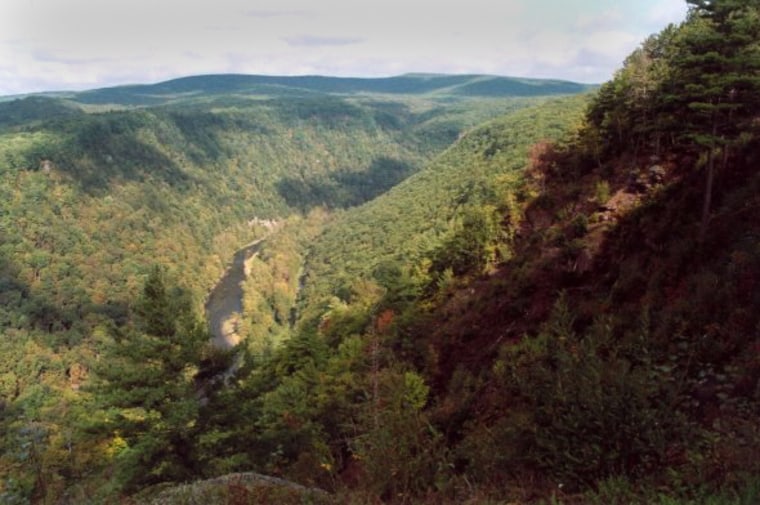It's a gorgeous hilly canyon carpeted by leafy trees that turn gold and red this time of year. Its waterfall-laden trails descend through cool layers of pine. And on its canyon floor there's room to both pedal and paddle.
This north-central Pennsylvania spot is surprisingly beautiful, surprisingly peaceful and altogether grand.
Its name? The Grand Canyon of Pennsylvania.
But wait. The name. The typical first reaction to hearing it: "There's really such a thing as the Grand Canyon of Pennsylvania?"
Thanks to a $600 tourism promotion campaign in 1936, yes, there is.
"This really isn't that grand," admits Tim Morey, an environmental education specialist for Leonard Harrison State Park, on the east side of the canyon. "But this is so much more beautiful and vital, because it's green, than the 'real' grand canyon. Some people think it's a little misleading, but ... "
Cindy Losinger, a local resident, says she knows many of her fellow Pennsylvanians don't know about the Grand Canyon.
"They usually assume you're talking about the one in Arizona," she said.
That more well-known Grand Canyon, the one in Arizona, is 6,000 feet at its deepest. Pennsylvania's humble gorge is 1,450 feet.
"The people in West Virginia just laugh at us," said Tom Livesey, a raft guide. "I'm surprised more people aren't disappointed — it's kind of a big name. But once you get here you can't help but enjoy it."
No, you can't. A lofty perch atop the gorge is a perfect place to view the layered, leafy ravines that bend into the canyon. Other sights and sounds: Creek-size waterfalls pouring downward, turkey vultures soaring on air currents, and (if you're an early riser) a fog-filled canyon.
Far below, canoeists paddle Pine Creek, and cyclists peddle alongside, on the 42-mile rails-to-trails path, where the occasional horse and rider also trot by.
The view from below is as grand as that from above: Trees soar above you in every direction. Clouds appear to hang off the lip of the canyon rim. And rock croppings peak out from the canyon walls far above.
Great views can be found on either side of the canyon.
"What most people would say they like about it is it's peaceful, its wilderness, the breathtaking views, the wildlife," said Morey, moments after teaching a group of school kids about the park's wildlife.
The park is in an isolated and sparsely populated region of north-central Pennsylvania, about 100 miles north of Harrisburg. Because of that isolation, Morey said, the area is underdeveloped, adding to its appeal.
The canyon gets about 400,000 visitors a year. By comparison, Erie's Presque Isle State Park gets 4 million visitors annually.
But Presque Isle doesn't have a West Rim Trail, a ridge-running path on the Colton Point side of the canyon that rises in step with the gorge, providing increasingly spectacular views with every foot of elevation. (If you don't have time for that, hike the Barbour Rock Trail.)
One visitor willing to make the drive recently was Peter Doyle, who drove up from Sweet Valley, 110 miles away by car, and was scouring the canyon with his binoculars.
"I've been meaning to come up here," said Doyle, a former Appalachian Trail section hiker who was scouting the area for his wife. "This is worth coming back to."
And Doyle's take on the canyon's grand name? "It captures the imagination. But it's a pretty neat thing to see."
